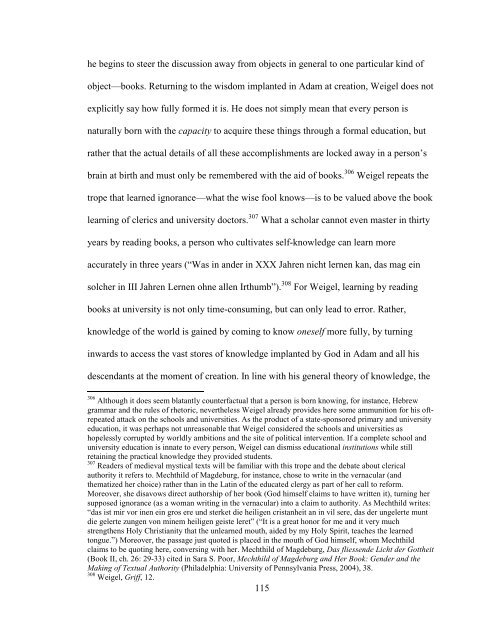the mystical theology of valentin weigel - DataSpace at Princeton ...
the mystical theology of valentin weigel - DataSpace at Princeton ...
the mystical theology of valentin weigel - DataSpace at Princeton ...
You also want an ePaper? Increase the reach of your titles
YUMPU automatically turns print PDFs into web optimized ePapers that Google loves.
he begins to steer <strong>the</strong> discussion away from objects in general to one particular kind <strong>of</strong><br />
object—books. Returning to <strong>the</strong> wisdom implanted in Adam <strong>at</strong> cre<strong>at</strong>ion, Weigel does not<br />
explicitly say how fully formed it is. He does not simply mean th<strong>at</strong> every person is<br />
n<strong>at</strong>urally born with <strong>the</strong> capacity to acquire <strong>the</strong>se things through a formal educ<strong>at</strong>ion, but<br />
ra<strong>the</strong>r th<strong>at</strong> <strong>the</strong> actual details <strong>of</strong> all <strong>the</strong>se accomplishments are locked away in a person’s<br />
brain <strong>at</strong> birth and must only be remembered with <strong>the</strong> aid <strong>of</strong> books. 306 Weigel repe<strong>at</strong>s <strong>the</strong><br />
trope th<strong>at</strong> learned ignorance—wh<strong>at</strong> <strong>the</strong> wise fool knows—is to be valued above <strong>the</strong> book<br />
learning <strong>of</strong> clerics and university doctors. 307 Wh<strong>at</strong> a scholar cannot even master in thirty<br />
years by reading books, a person who cultiv<strong>at</strong>es self-knowledge can learn more<br />
accur<strong>at</strong>ely in three years (“Was in ander in XXX Jahren nicht lernen kan, das mag ein<br />
solcher in III Jahren Lernen ohne allen Irthumb”). 308 For Weigel, learning by reading<br />
books <strong>at</strong> university is not only time-consuming, but can only lead to error. Ra<strong>the</strong>r,<br />
knowledge <strong>of</strong> <strong>the</strong> world is gained by coming to know oneself more fully, by turning<br />
inwards to access <strong>the</strong> vast stores <strong>of</strong> knowledge implanted by God in Adam and all his<br />
descendants <strong>at</strong> <strong>the</strong> moment <strong>of</strong> cre<strong>at</strong>ion. In line with his general <strong>the</strong>ory <strong>of</strong> knowledge, <strong>the</strong><br />
306 Although it does seem bl<strong>at</strong>antly counterfactual th<strong>at</strong> a person is born knowing, for instance, Hebrew<br />
grammar and <strong>the</strong> rules <strong>of</strong> rhetoric, never<strong>the</strong>less Weigel already provides here some ammunition for his <strong>of</strong>trepe<strong>at</strong>ed<br />
<strong>at</strong>tack on <strong>the</strong> schools and universities. As <strong>the</strong> product <strong>of</strong> a st<strong>at</strong>e-sponsored primary and university<br />
educ<strong>at</strong>ion, it was perhaps not unreasonable th<strong>at</strong> Weigel considered <strong>the</strong> schools and universities as<br />
hopelessly corrupted by worldly ambitions and <strong>the</strong> site <strong>of</strong> political intervention. If a complete school and<br />
university educ<strong>at</strong>ion is inn<strong>at</strong>e to every person, Weigel can dismiss educ<strong>at</strong>ional institutions while still<br />
retaining <strong>the</strong> practical knowledge <strong>the</strong>y provided students.<br />
307 Readers <strong>of</strong> medieval <strong>mystical</strong> texts will be familiar with this trope and <strong>the</strong> deb<strong>at</strong>e about clerical<br />
authority it refers to. Mechthild <strong>of</strong> Magdeburg, for instance, chose to write in <strong>the</strong> vernacular (and<br />
<strong>the</strong>m<strong>at</strong>ized her choice) ra<strong>the</strong>r than in <strong>the</strong> L<strong>at</strong>in <strong>of</strong> <strong>the</strong> educ<strong>at</strong>ed clergy as part <strong>of</strong> her call to reform.<br />
Moreover, she disavows direct authorship <strong>of</strong> her book (God himself claims to have written it), turning her<br />
supposed ignorance (as a woman writing in <strong>the</strong> vernacular) into a claim to authority. As Mechthild writes:<br />
“das ist mir vor inen ein gros ere und sterket die heiligen cristanheit an in vil sere, das der ungelerte munt<br />
die gelerte zungen von minem heiligen geiste leret” (“It is a gre<strong>at</strong> honor for me and it very much<br />
streng<strong>the</strong>ns Holy Christianity th<strong>at</strong> <strong>the</strong> unlearned mouth, aided by my Holy Spirit, teaches <strong>the</strong> learned<br />
tongue.”) Moreover, <strong>the</strong> passage just quoted is placed in <strong>the</strong> mouth <strong>of</strong> God himself, whom Mechthild<br />
claims to be quoting here, conversing with her. Mechthild <strong>of</strong> Magdeburg, Das fliessende Licht der Got<strong>the</strong>it<br />
(Book II, ch. 26: 29-33) cited in Sara S. Poor, Mechthild <strong>of</strong> Magdeburg and Her Book: Gender and <strong>the</strong><br />
Making <strong>of</strong> Textual Authority (Philadelphia: University <strong>of</strong> Pennsylvania Press, 2004), 38.<br />
308 Weigel, Griff, 12.<br />
115
















